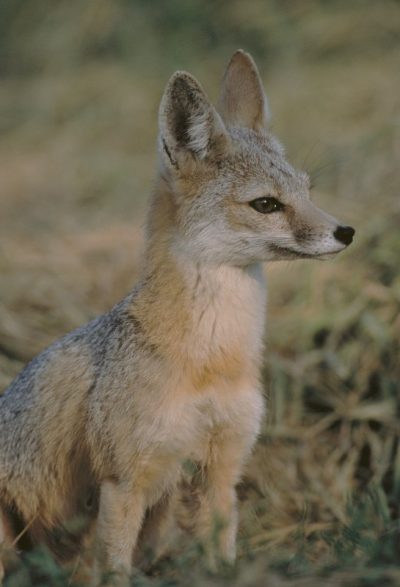Colorado Bans Cruel Wildlife-killing Contests
State Joins Five Others That Prohibit Competitive Killing of Coyotes, Foxes and More for Prizes

The Colorado Parks and Wildlife Commission voted yesterday to ban wildlife-killing contests for various furbearing and small game species in the state. Colorado is the sixth state to prohibit these cruel events.
When it goes into effect on June 30, this new regulation will end events such as the High Desert Predator Classic in Pueblo, the Song Dog Coyote Hunt in Keenesburg, and the San Luis Valley Coyote Calling Competition.
Winners of wildlife-killing contests often proudly post photos and videos on social media that show them posing with piles of dead coyotes and other animals, often before disposing of the animals in “carcass dumps” away from the public eye.
“Participants of wildlife-killing contests often use unsporting and cruel techniques, such as calling devices that mimic the sound of prey or even pups in distress, so that they can lure shy coyotes and other animals to shoot at close range,” said Aubyn Royall, Colorado state director for the Humane Society of the United States. “We thank Colorado Parks and Wildlife and the commission for taking decisive action to ensure that Colorado no longer supports the senseless killing of its treasured wildlife.”
“We’re thrilled that Colorado is banning these wasteful wildlife-killing contests,” said Collette Adkins, carnivore conservation director at the Center for Biological Diversity. “Coyotes and other carnivores play such important ecological roles, but they were mercilessly targeted by these barbaric events. This decision by the Colorado Parks and Wildlife Commission is a big win for Colorado’s coyotes, and we’re celebrating.”
“Colorado’s ban, which is supported by the best scientific data available, is one of the strongest in the country,” said Johanna Hamburger, wildlife attorney for the Animal Welfare Institute. “The state has now joined multiple fish and wildlife agencies and commissions in concluding that these contests compromise the effective management of wildlife populations, fail to increase game populations and harm ecosystems.”
Colorado joins five other states — California, Vermont, New Mexico, Arizona and Massachusetts — that have taken a stand against cruel, unsporting and wasteful wildlife-killing contests. California banned the awarding of prizes for killing furbearing and non-game mammals in 2014; New Mexico and Vermont outlawed coyote-killing contests in 2019 and 2018, respectively; and Arizona and Massachusetts prohibited killing contests that target predator and furbearer species in late 2019.
“Wildlife-killing contests are a bloodsport just like dogfighting and cockfighting, which have been outlawed nationwide,” said Camilla Fox, founder and executive director of Project Coyote. “We commend Colorado Parks and Wildlife and the commission for relegating these ecologically and ethically indefensible events to the history books.”
“The majority of Coloradans respect and value wildlife and this step forward by our state wildlife department is in line with those values,” said Lindsay Larris, wildlife program director for WildEarth Guardians. “We look forward to seeing CPW continue to advance policies that reflect the importance of wildlife protection to all people in Colorado.”
“Recognizing that all species play an important role in their ecosystem, we commend Colorado Parks and Wildlife and the Commission for this forward-thinking, science-based decision to prohibit the senseless slaughter inherent to killing contests,” said Stephanie Harris, senior legislative affairs manager for the Animal Legal Defense Fund.
“All native wildlife species are essential,” said Delia Malone from the Colorado Sierra Club. “Ecology and ethics require that we protect all native species, including those that have historically been vilified or dismissed as unimportant. Natives such as coyotes and prairie dogs contribute to healthy, viable, resilient ecosystems, and deserve our respect and our protection. We are gratified that Colorado Parks and Wildlife has chosen conservation.”
Background
This ban prohibits killing contests that target species including mink, pine marten, badger, red fox, gray fox, swift fox, striped skunk, western spotted skunk, beaver, muskrat, long-tailed weasel, short-tailed weasel, coyote, bobcat, opossum, ring-tailed cat and raccoon, as well as the Wyoming ground squirrel. Species also include white-tailed, black-tailed and Gunnison’s prairie dogs.
Wildlife agencies and professionals across the country have expressed concerns about killing contests because they reflect poorly on responsible sportsmen and sportswomen. In 2019 alone, the Arizona Game and Fish Commission and the Massachusetts Fisheries and Wildlife Board voted to prohibit these gruesome killing contests, citing the grave damage that such events could inflict on the image of hunting in their states.
Wildlife management professionals have also noted that wildlife-killing contests contravene modern, science-based wildlife management principles. In 2018, more than 70 renowned conservation scientists issued a statement citing peer-reviewed science refuting claims that indiscriminately killing coyotes permanently limits coyote populations, increases the number of deer or other game species for hunters, or reduces conflicts with humans, pets or livestock. In fact, randomly shooting coyotes disrupts their pack structure, leading to increases in their populations and more conflicts. Nonlethal, preventive measures are most effective at reducing conflicts with wildlife.
Wildlife-killing contests are also destructive to healthy ecosystems, within which all native wildlife species play a crucial role. Coyotes and other targeted species help to control rabbit and rodent populations and restrict rodent- and tick-borne disease transmission. And prairie dogs are an important keystone species in Colorado’s ecosystem, providing essential food and digging underground tunnels used by other native wildlife.
*
Note to readers: please click the share buttons above or below. Forward this article to your email lists. Crosspost on your blog site, internet forums. etc.
Featured image is from USFWS

